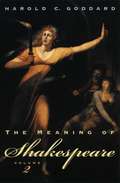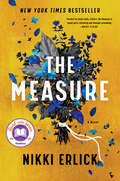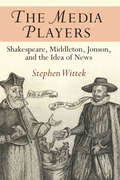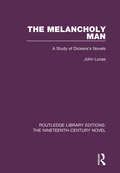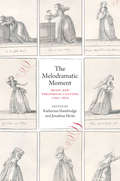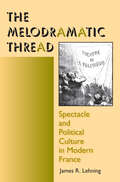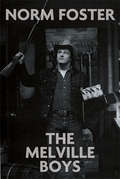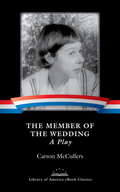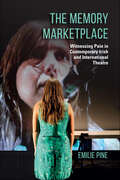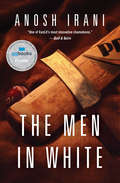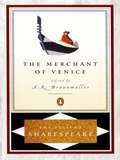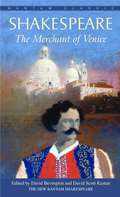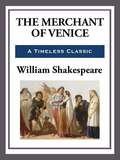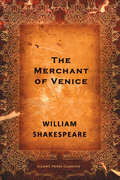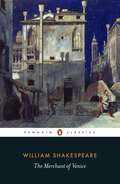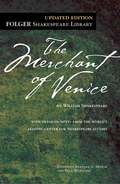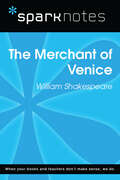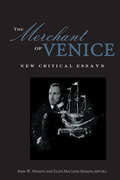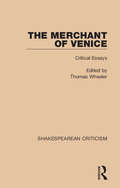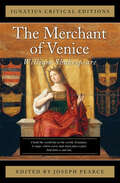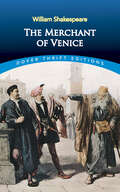- Table View
- List View
The Meaning of Shakespeare (Volume II)
by Harold C. GoddardIn two magnificent and authoritative volumes, Harold C. Goddard takes readers on a tour through the works of William Shakespeare, celebrating his incomparable plays and unsurpassed literary genius.
The Measure: A Novel
by Nikki ErlickINSTANT NEW YORK TIMES BESTSELLER - The Read With Jenna Today Show Book Club Pick!"A story of love and hope as interweaving characters display: how all moments, big and small, can measure a life. If you want joy, love, romance, and hope—read with us." —Jenna Bush Hager A luminous, spirit-lifting blockbuster that asks: would you choose to find out the length of your life?Eight ordinary people. One extraordinary choice.It seems like any other day. You wake up, drink a cup of coffee, and head out.But today, when you open your front door, waiting for you is a small wooden box. The contents of this mysterious box tells you the exact number of years you will live.From suburban doorsteps to desert tents, every person on every continent receives the same box. In an instant, the world is thrust into a collective frenzy. Where did these boxes come from? What do they mean? Is there truth to what they promise?As society comes together and pulls apart, everyone faces the same shocking choice: Do they wish to know how long they’ll live? And, if so, what will they do with that knowledge?The Measure charts the dawn of this new world through an unforgettable cast of characters whose decisions and fates interweave with one another: best friends whose dreams are forever entwined, pen pals finding refuge in the unknown, a couple who thought they didn’t have to rush, a doctor who cannot save himself, and a politician whose box becomes the powder keg that ultimately changes everything.Enchanting and deeply uplifting, The Measure is an ambitious, invigorating story about family, friendship, hope, and destiny that encourages us to live life to the fullest.
The Media Players
by Stephen WittekThe Media Players: Shakespeare, Middleton, Jonson, and the Idea of News builds a case for the central, formative function of Shakespeare's theater in the news culture of early modern England. In an analysis that combines historical research with recent developments in public sphere theory, Dr. Stephen Wittek argues that the unique discursive space created by commercial theater helped to foster the conceptual framework that made news possible. Dr. Wittek's analysis focuses on the years between 1590 and 1630, an era of extraordinary advances in English news culture that begins with the first instance of serialized news in England and ends with the emergence of news as a regular, permanent fixture of the marketplace. Notably, this period of expansion in news culture coincided with a correspondingly extraordinary era of theatrical production and innovation, an era that marks the beginning of commercial theater in London, and has left us with the plays of William Shakespeare, Ben Jonson, and Thomas Middleton. Book jacket.
The Melancholy Man: A Study of Dickens's Novels (Routledge Library Editions: The Nineteenth-Century Novel #25)
by John LucasFirst published in 1980, this book surveys Dickens’ growing power to drive deep into the causes of his contemporary conditions. It reveals the importance of nature to Dickens as a rich metaphor of human freedom and potentiality, and emphasises his concern with time and the problems of freedom. The author considers the peculiarity of Dickens being unanimously acclaimed as a great writer considering the difficulty in placing him definitively within the literary tradition. The author argues Dickens was an isolated figure, indifferent to changing fashions and with a strong sense of the dignity of human nature and that this formed the basis of his character and writings.
The Melodramatic Moment: Music and Theatrical Culture, 1790–1820
by Jonathan Hicks Katherine HambridgeWe seem to see melodrama everywhere we look—from the soliloquies of devastation in a Dickens novel to the abject monstrosity of Frankenstein’s creation, and from Louise Brooks’s exaggerated acting in Pandora’s Box to the vicissitudes endlessly reshaping the life of a brooding Don Draper. This anthology proposes to address the sometimes bewilderingly broad understandings of melodrama by insisting on the historical specificity of its genesis on the stage in late-eighteenth-century Europe. Melodrama emerged during this time in the metropolitan centers of London, Paris, Vienna, and Berlin through stage adaptations of classical subjects and gothic novels, and they became famous for their use of passionate expression and spectacular scenery. Yet, as contributors to this volume emphasize, early melodramas also placed sound at center stage, through their distinctive—and often disconcerting—alternations between speech and music. This book draws out the melo of melodrama, showing the crucial dimensions of sound and music for a genre that permeates our dramatic, literary, and cinematic sensibilities today. A richly interdisciplinary anthology, The Melodramatic Moment will open up new dialogues between musicology and literary and theater studies.
The Melodramatic Thread: Spectacle and Political Culture in Modern France (Interdisciplinary Studies in History)
by James R. Lehning“This ambitious undertaking is concerned with the melodramatic form in theatre and film and its impact on French political culture.” —H-France ReviewIn France, both political culture and theatrical performances have drawn upon melodrama. This “melodramatic thread” helped weave the country’s political life as it moved from monarchy to democracy. By examining the relationship between public ceremonies and theatrical performance, James R. Lehning sheds light on democratization in modern France. He explores the extent to which the dramatic forms were present in the public performance of political power. By concentrating on the Republic and the Revolution and on theatrical performance, Lehning affirms the importance of examining the performative aspects of French political culture for understanding the political differences that have marked France in the years since 1789.“In this thoroughly researched and persuasive book, Lehning provides a fascinating reading of public performances in modern France . . . This is an important contribution to the study of French culture and the democratization process . . . Essential.” —Choice“Lehning’s application of the themes of melodrama to French political culture offers new insights into French history. His style is lively, clear, and highly readable.” —Venita Datta, Wellesley College“The analyses in this book make a real contribution to debates about the ways in which art, particularly popular art, and politics interact; how politics itself is theatrical in the French case; and the role of ritual in politics and the function of politics as ritual and ceremony.” —John Gaffney, Aston University
The Melville Boys
by Norm FosterA relaxing weekend trip full of fishing, football, and beer is on the agenda for the Melville brothers. Unfortunately, so is confronting eldest brother Lee's terminal illness. But weekend plans are suddenly thrown for a loop when the boys meet two attractive sisters, who inadvertently change more than just their agenda. In this modern Canadian classic, Norm Foster offers a lighthearted comedy full of vigour about brotherhood and the unexpected.
The Member of the Wedding: A Play
by Carlos Dews Carson McCullers<p>Celebrated worldwide for her masterly novels, Carson McCullers was equally accomplished, and equally moving, when writing in other forms. <p>The play The Member of the Wedding (1950), adapted from her 1946 novel at the urging of her close friend Tennessee Williams is, like Thornton Wilder’s Our Town, a great American poem for the stage. <p>At its center is tomboy Frankie Addams, a motherless adolescent neglected by her father and utterly bored with life in small-town Georgia until romantic longing is ignited by her older brother’s wedding. A hit on Broadway, running for more than five hundred performances, it won the Drama Critics’ Circle Award and soon inspired a film.
The Memory Marketplace: Witnessing Pain in Contemporary Irish and International Theatre (Irish Culture, Memory, Place)
by Emilie PineWhat happens when cultural memory becomes a commodity? Who owns the memory? In The Memory Marketplace, Emilie Pine explores how memory is performed both in Ireland and abroad by considering the significant body of contemporary Irish theatre that contends with its own culture and history. Analyzing examples from this realm of theatre, Pine focuses on the idea of witnesses, both as performers on stage and as members of the audience. Whose memories are observed in these transactions, and how and why do performances prioritize some memories over others? What does it mean to create, rehearse, perform, and purchase the theatricalization of memory? The Memory Marketplace shows this transaction to be particularly fraught in the theatricalization of traumatic moments of cultural upheaval, such as the child sexual abuse scandal in Ireland. In these performances, the role of empathy becomes key within the marketplace dynamic, and Pine argues that this empathy shapes the kinds of witnesses created. The complexities and nuances of this exchange—subject and witness, spectator and performer, consumer and commodified—provide a deeper understanding of the crucial role theatre plays in shaping public understanding of trauma, memory, and history.
The Men in White
by Anosh IraniA finalist for the Governor General’s Award for Drama, The Men in White explores urgent themes surrounding the complexities of the modern immigrant experience, Islamophobia, and the unifying power of sport — the masterful playwright and novelist Anosh Irani at his finest.Eighteen-year-old Hasan Siddiqui lives in a bustling Muslim quarter of Bombay. He escapes the drudgery of his work at a chicken slaughterhouse by fostering two fervent dreams — to become a star in cricket, a sport at which he happens to excel, and to win the affections of Haseena, a fiercely intelligent young woman two years his junior. Half a world away in Vancouver, Hasan’s older brother, Abdul, has been working under the table at an Indian restaurant, attempting to set down roots with the hope of one day reuniting with his brother. For Abdul the immigrant dream shows little sign of materializing, but he finds solace in his amateur cricket team. When he and the team’s captain decide to take action to end their losing streak, they talk of recruiting the talented Hasan for the rest of the season. But bringing Hasan from India to Canada will take much more than just a plane ticket, and rising tensions demonstrate that not all members of the team agree with the high cost.
The Merchant of Venice
by William Shakespeare Stephen Orgel A. R. Braunmuller"I feel that I have spent half my career with one or another Pelican Shakespeare in my back pocket. Convenience, however, is the least important aspect of the new Pelican Shakespeare series. Here is an elegant and clear text for either the study or the rehearsal room, notes where you need them and the distinguished scholarship of the general editors, Stephen Orgel and A. R. Braunmuller who understand that these are plays for performance as well as great texts for contemplation." (Patrick Stewart) The distinguished Pelican Shakespeare series, which has sold more than four million copies, is now completely revised and repackaged. Each volume features: * Authoritative, reliable texts * High quality introductions and notes * New, more readable trade trim size * An essay on the theatrical world of Shakespeare and essays on Shakespeare's life and the selection of texts
The Merchant of Venice
by William Shakespeare Stephen Orgel A. R. BraunmullerThe acclaimed Pelican Shakespeare series edited by A. R. Braunmuller and Stephen Orgel The legendary Pelican Shakespeare series features authoritative and meticulously researched texts paired with scholarship by renowned Shakespeareans. Each book includes an essay on the theatrical world of Shakespeare’s time, an introduction to the individual play, and a detailed note on the text used. Updated by general editors Stephen Orgel and A. R. Braunmuller, these easy-to-read editions incorporate over thirty years of Shakespeare scholarship undertaken since the original series, edited by Alfred Harbage, appeared between 1956 and 1967. With definitive texts and illuminating essays, the Pelican Shakespeare will remain a valued resource for students, teachers, and theater professionals for many years to come. For more than seventy years, Penguin has been the leading publisher of classic literature in the English-speaking world. With more than 1,700 titles, Penguin Classics represents a global bookshelf of the best works throughout history and across genres and disciplines. Readers trust the series to provide authoritative texts enhanced by introductions and notes by distinguished scholars and contemporary authors, as well as up-to-date translations by award-winning translators. From the Trade Paperback edition.
The Merchant of Venice
by William Shakespeare David Bevington David Scott KastanThis is one of Shakespeare's darkest comedies, for the romantic story of a young man, Bassanio, who has squandered his fortune and must borrow money to woo the wealthy lady he loves is set against the more disturbing story of the Jewish moneylender Shylock and his demand for the "pound of flesh" owed him by the Venetian merchant, Antonio. Here pathos and farce combine with moral complexity and romantic entanglement to display the extraordinary power and range of Shakespeare at his best.Each Edition Includes:* Comprehensive explanatory notes * Vivid introductions and the most up-to-date scholarship * Clear, modernized spelling and punctuation, enabling contemporary readers to understand the Elizabethan English* Completely updated, detailed bibliographies and performance histories * An interpretive essay on film adaptations of the play, along with an extensive filmography.
The Merchant of Venice
by William ShakespeareShakespearean play with two subplots 1) Antonio defaults on a loan from Shylock the Jew, who demands his life as bond 2) Portia must marry the man who passes a test her father arranged.
The Merchant of Venice
by William ShakespeareANTONIO. In sooth, I know not why I am so sad. It wearies me; you say it wearies you; But how I caught it, found it, or came by it, What stuff 'tis made of, whereof it is born, I am to learn; And such a want-wit sadness makes of me That I have much ado to know myself. SALERIO. Your mind is tossing on the ocean; There where your argosies, with portly sail- Like signiors and rich burghers on the flood, Or as it were the pageants of the sea- Do overpeer the petty traffickers, That curtsy to them, do them reverence, As they fly by them with their woven wings.
The Merchant of Venice
by William Shakespeare"The Merchant of Venice" is the story of Antonio, the drama's title character, and his friend Bassanio. Bassanio is in need of money so that he may woo Portia, a wealthy heiress. Bassanio asks Antonio for a loan and Antonio agrees to this loan, however all his money is tied up in shipping ventures. Together the two go to Shylock, a Jewish moneylender, to request a loan for Bassanio to be guaranteed against Antonio's shipping ventures. Shylock agrees to the loan at no interest in the condition that if the debt is not repaid Shylock may collect a pound of Antonio's flesh. At the same time Portia, who is being wooed by various suitors, is upset over a curious stipulation in her father's will regarding the man that she may marry.
The Merchant of Venice
by William ShakespeareVenetian nobleman Antonio stands to lose a pound of flesh when he is unable to repay a loan due to the Jewish moneylender Shylock.
The Merchant of Venice
by William Shakespeare'The man who of all modern, and perhaps ancient poets, had the largest and most comprehensive soul' John DrydenAntonio, a Venetian merchant, wishes to help his friend get money to impress a rich heiress. But he is forced to borrow the sum from a cynical, abused Jewish moneylender, Shylock, and signs a chilling contract to honour the debt with a pound of his own flesh. An ambiguous, complex and controversial comedy, The Merchant of Venice explores prejudice, marriage, money and the true nature of justice in an unforgiving world.Used and Recommended by the National TheatreGeneral Editor Stanley WellsEdited by W. Moelwyn Merchant Introduction by Peter Holland
The Merchant of Venice (Folger Shakespeare Library)
by William Shakespeare Barbara A. Mowat Paul WerstineFolger Shakespeare Library The world's leading center for Shakespeare studies Each edition includes: Freshly edited text based on the best early printed version of the play Full explanatory notes conveniently placed on pages facing the text of the play Scene-by-scene plot summaries A key to famous lines and phrases An introduction to reading Shakespeare's language An essay by an outstanding scholar providing a modern perspective on the play Illustrations from the Folger Shakespeare Library's vast holdings of rare books Essay by Alexander Leggatt The Folger Shakespeare Library in Washington, D.C., is home to the world's largest collection of Shakespeare's printed works, and a magnet for Shakespeare scholars from around the globe. In addition to exhibitions open to the public throughout the year, the Folger offers a full calendar of performances and programs.
The Merchant of Venice (SparkNotes Literature Guide Series)
by SparkNotesThe Merchant of Venice (SparkNotes Literature Guide) by William Shakespeare Making the reading experience fun! Created by Harvard students for students everywhere, SparkNotes is a new breed of study guide: smarter, better, faster. Geared to what today's students need to know, SparkNotes provides: *Chapter-by-chapter analysis *Explanations of key themes, motifs, and symbols *A review quiz and essay topicsLively and accessible, these guides are perfect for late-night studying and writing papers
The Merchant of Venice (The New Cambridge Shakespeare)
by William Shakespeare M. M. MahoodCharles Edelman focuses on the play's sexual politics and recent scholarship devoted to the position of Jews in Shakespeare's time in this new edition. He surveys the international scope of theatrical interpretations of The Merchant in the 1980s and 1990s as well as different ways of tackling the troubling figure of Shylock. First Edition Hb (1988): 0-521-22156-0 First Edition Pb (1988): 0-521-29371-5
The Merchant of Venice: Critical Essays (Shakespeare Criticism #26)
by John W. Mahon Ellen Macleod MahonThis volume is a collection of all-new original essays covering everything from feminist to postcolonial readings of the play as well as source queries and analyses of historical performances of the play. The Merchant of Venice is a collection of seventeen new essays that explore the concepts of anti-Semitism, the work of Christopher Marlowe, the politics of commerce and making the play palatable to a modern audience. The characters, Portia and Shylock, are examined in fascinating detail. With in-depth analyses of the text, the play in performance and individual characters, this book promises to be the essential resource on the play for all Shakespeare enthusiasts.
The Merchant of Venice: Critical Essays (Shakespearean Criticism)
by Thomas WheelerOriginally published in 1991. Essays here are arranged chronologically within sections: ‘The Play as Text’, ‘Shylock’ and ‘The Play in the Theatre.’ Collecting previously published important commentaries and scholarly articles, this volume in the Shakespearean Criticism set looks at one of the Bard’s most disturbing plays. These historical critical pieces give witness to the changing attitudes to the play and the characters and provide readers with a wide range of material relating both to performances and to textual readings.
The Merchant of Venice: With Contemporary Criticism (Ignatius Critical Editions)
by William ShakespeareThe Merchant of Venice is probably the most controversial of all Shakespeare's plays. It is also one of the least understood. Is it a comedy or a tragedy? What is the meaning behind the test of the caskets? Who is the real villain of the trial scene? Is Shylock simply vicious and venomous, or is he more sinned against than sinning? Can the play be described as anti-semitic? What exactly is the quality of mercy? Is Portia one of the great Christian heroines of western literature? And what of the comedy of the rings with which Shakespeare ends the play? These questions and many others are answered in this critical edition of one of the Bard's liveliest plays.
The Merchant of Venice: With The Extreme Cruelty Of Shylocke The Iew Towards The Saide Merchant, In Cutting An Iust Pound Of His Flesh; And The Obtaining Of Portia, By The Choyse Of Three Caskets (classic Reprint) (Dover Thrift Editions: Plays)
by William ShakespeareThe Merchant of Venice is an intriguing drama of love, greed, and revenge. At its heart, the play contrasts the characters of the maddened and vengeful Shylock, a Venetian moneylender, with the gracious, level-headed Portia, a wealthy young woman besieged by suitors. At the play's climax, Shylock insists on the enforcement of a binding contract that will cost the life of the merchant Antonio — inciting Portia to mount a memorable defense.In this richly plotted drama, Shylock, whom Shakespeare endowed with all of the depth and vitality of his greatest characters, is not alone in his villainy. In scene after scene, a large cast of ambitious and scheming characters demonstrates that honesty is a quality often strained where matters of love and money are concerned.The gravity and suspense of the play's central plot, together with its romance, have made The Merchant of Venice a favorite of audiences, and one of the most studied and performed of Shakespeare's plays. It is reprinted here from an authoritative text, complete with explanatory footnotes.
